The Joy of Hanukkah
1 small grated onion
1 teaspoon salt
1/4 teaspoon pepper
2 tablespoons matzo meal
2 eggs
5 peeled, grated potatoes that you’ve squeezed the life out of in an effort to remove the liquid
To the untrained eye, these ingredients may seem a bit uninspiring. But to anyone who celebrates Hanukkah, the recipe is instantly recognizable. It’s the batter for fried potato latkes—one of the favorite symbols of the joyous Jewish holiday. Mmm, mmm, good!
Potato latkes, sufganiyot (Hebrew for jelly donuts), special songs, special food, and special times with family and friends are all part of the eight-day celebration of Hanukkah, a festival that commemorates the Jewish victory over the Syrian tyrant Antiochus IV, who tried to exterminate Judaism in the second century B.C.
“It’s a holiday about religious freedom,” said one rabbi. “People wanted to destroy us from worshiping our God. You worship God as you see fit. No one is to tell you how to worship.”
To celebrate, the rabbi gathers his family together. “We sing songs, we say the blessing, we light the menorah, and we exchange presents. It’s a happy time,” he said. “Ours is a religion bringing family together, celebrated in the home.”
Reba, a Jewish mother of three, feels much the same way. “We try to have a lot of company during Hanukkah. Lots of times we’ll have someone over every night. The nice thing about Hanukkah,” said Reba, “is that it’s a real family, in-the-house holiday. It’s something you do in the home. It reminds you that you’re Jewish.”
In Reba’s home, all three children have their own menorah, so they can all participate in the joy of saying the blessing and lighting the holiday candles. Lighting the menorah, or hanukkiah, as this particular menorah is called, symbolizes the holiday perhaps more than anything else because it is a direct reminder of the 2,000-year-old story of one little cruse of oil and the miracle of deliverance that God wrought for His people Israel.
As all children who attend Hebrew school know, the story begins in 167 B.C. with an evil Syrian ruler named Antiochus IV, whose delusions of godhood induced him to call himself Antiochus Epiphanes, meaning the visible god. Determined to eradicate Judaism and force the Jewish people to adopt every aspect of Greek culture and worship, Antiochus outlawed all Jewish practices and unleashed a nightmare of torture and persecution upon God’s people. He placed idols throughout the Temple in Jerusalem, desecrated the Temple altar by sacrificing a female pig on it, and savagely murdered anyone caught practicing Judaism. In the holy of holies, where the ark of the covenant stood in the days of the first Temple, Antiochus erected a huge statue of the Greek god Zeus that looked suspiciously like himself.
Anyone who managed to flee Jerusalem was hunted down in the villages. One day the persecution came to a village called Modí-in. When a Syrian soldier assembled the villagers and commanded them to eat the flesh of a pig—something strictly forbidden by Jewish law—Mattathias, a leader and descendant of the priestly Hasmonean family, refused. He killed the soldier and sparked an instantaneous revolt. Mattathias and his sons, the most famous of whom was Judah, fled to the mountains, where they trained men to fight the Syrians. First Judah and later his brothers were called Maccabees, meaning hammers, because of the hammer-like blows they dealt to Antiochus’ army.
After three years of fighting, the little band of rebels led by the Maccabees liberated the city of Jerusalem, recaptured the Temple, cleansed it of Greek idols, and rededicated it to the one and only living God, the Lord God of Israel. However, they could locate only one cruse of the special oil needed to rekindle the Temple menorah. As the ancient legend goes, that one little cruse, enough to last a day at most, miraculously burned for eight days—just long enough for the Jewish people to consecrate new oil.
Consequently, Hanukkah candles are lit each night for eight nights. The hanukkiah contains nine branches rather than the standard seven because it holds one candle for each of the festival’s eight days, plus a servant candle, or shamash, which is used to light the other candles.
“I like lighting the candles,” said Reba’s nine-year-old daughter. “That’s really fun. We say the blessings, and I have my own menorah.”
On the first night, the hanukkiah contains only two candles—the shamash and one candle placed on the far right. Each night, another candle is added, from the right side to the left, until the hanukkiah is in full blaze on the last night of the holiday. As the candles are lit, a blessing is said:
Blessed art thou, O Lord our God, ruler of the universe, who has sanctified us with your commandments and commanded us to light the hanukkah candles. Blessed art thou, O Lord our God, ruler of the universe, who has performed miracles for our ancestors in those days, in this season.
On the first night only, an additional blessing is said: “Blessed art thou, O Lord our God, ruler of the universe, who has granted us life, sustained us, and enabled us to reach this season.”
The word Hanukkah means dedication. The holiday actually occupies a minor spot on the Jewish calendar because it was not ordained by God in the Hebrew Scriptures. In fact, it is not mentioned anywhere in the Hebrew Bible, and with good reason. The Maccabean Revolt took place approximately 258 years after the last Jewish Scriptures were written. The holiday is mentioned in the New Testament, however. John 10:22–23 says that Jesus was in the Temple in Jerusalem during the “feast of the dedication.” Like most Jews, Jesus was there for Hanukkah.
To combat the ever-present hoopla of Christmas trees and Christmas presents, many Jewish families give their children little presents each night, culminating with one big present on the final night of the festival. But presents weren’t always associated with Hanukkah. According to the cantor of a large synagogue in New Jersey, many years ago European Jews began the tradition by giving a small coin to each of the younger children in the family. Thus originated the idea of Hanukkah gelt (Yiddish for money).
One gentleman, now in his forties, remembers with amusement the Hanukkah parties he attended at his Hebrew school when he was a boy. The teachers handed out to every child in attendance candy, a dreidel (Yiddish for spinning top), and a small brown envelope containing Hanukkah gelt. The gelt consisted of ten spanking new, shiny copper pennies, the likes of which were seen only on Hanukkah. Each class had a party, sang songs, then got down to the business of playing dreidel, at which time, this man said, he promptly lost every new penny he had just received!
He probably wasn’t the only one who went home bereft of his gelt because dreidel is a very popular game at Hanukkah. It too symbolizes the holiday and commemorates the great miracle of the Maccabean victory and the little cruse of oil. The dreidel, or s’veevon in Hebrew, is a four-sided top with a specific Hebrew letter on each side. Outside the State of Israel, the letters are Nun, Gimel, Hey, and Shin. They stand for the words Nase Gadol Hayah Sham, which, in English, mean, A great miracle happened there. In Israel, the letter Pey replaces the Shin to make the sentence declare, A great miracle happened here.
Each player begins with ten pennies, pieces of candy, toothpicks, beans, or whatever they have. To start the game, each player puts one item in the pot. The players take turns spinning the dreidel and complying with the action associated with each letter. If the dreidel lands with the Gimel up, the spinner can take the entire pot; Nun, he doesn’t put anything in and can’t take anything out; Hey, he can take half the pot; Shin, he must put one into the pot.
According to a Jewish legend, the game originated in Eastern Europe during a time when Jews were forbidden to study Torah (Jewish law). While they looked like they were playing dreidel, the Jewish people huddled around the top were actually studying Torah in secret (Susan Fischer Weis, The Complete Guide to Hanukkah, p. 15).
“I make the holiday bigger than I should,” said Reba, “because I want my kids to have something special at that time of year when it’s so hard to be a Jew.” The commercialism surrounding Christmas is everywhere, she said, and she wants her children to feel that their holiday is just as special.
On the Jewish calendar, Hanukkah begins each year on the 25th day of the month of Kislev. Translated to the standard Gregorian calendar, the holiday can fall at any time between early November and late December. “Once it fell on Thanksgiving,” said Reba. “That was torture. At least if you have Hanukkah coming up around Christmas, you have something to look forward to.”
Many Jewish people agree that rearing children in the Jewish tradition can be difficult around Christmas. Hanukkah is not the Jewish equivalent of Christmas, but it is often mistaken for it because of the emphasis on gift-giving. All that hoopla, says the synagogue cantor, has blown this minor holiday entirely out of proportion.
He said that in the Jewish tradition, Hanukkah is associated with religious repression, such as that suffered in the Soviet Union during the time of the Cold War and the refusniks. Jews were denied admission to colleges and were not permitted to work in certain professions. “They weren’t necessarily in physical danger, but they weren’t permitted to function as Jews. In Israel there’s not much going on around Hanukkah,” he said, “because people there don’t go crazy with commercialism. It’s a holiday about religious freedom, and we should never lose sight of that.”
According to the cantor, Israelis don’t go berserk frying potato latkes either. They tend to prefer sufganiyot (jelly donuts). Either way, both serve to remind people of the oil consecrated for the menorah because both are fried in oil.
So, if you have the urge, grate some potatoes, make some latkes, and rejoice with the Jewish people in the celebration of Hanukkah. Indeed, every born-again believer has cause to cheer the victory of the Maccabees. If Antiochus had succeeded in obliterating Judaism from the face of the earth, he would have destroyed Israel, the nation chosen by Almighty God to bring the Savior to the world.
Remember the former things of old; for I am God, and there is none else; I am God, and there is none like me, Declaring the end from the beginning, and from ancient times the things that are not yet done…I bring near my righteousness; it shall not be far off, and my salvation shall not tarry; and I will place salvation in Zion for Israel, my glory (Isa. 46:9–10, 13).
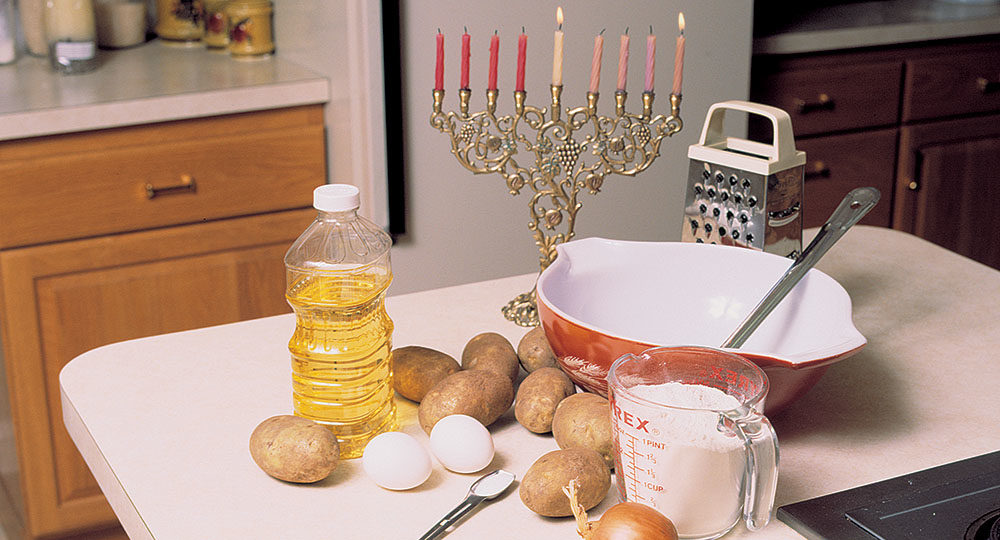
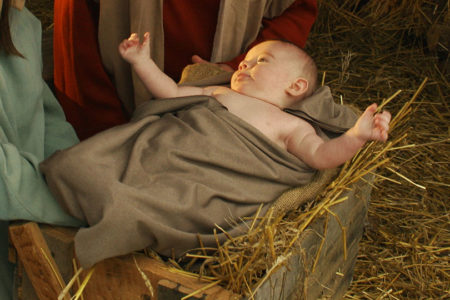
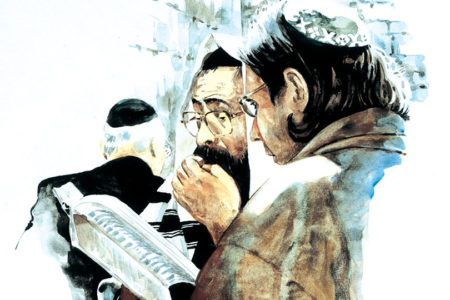
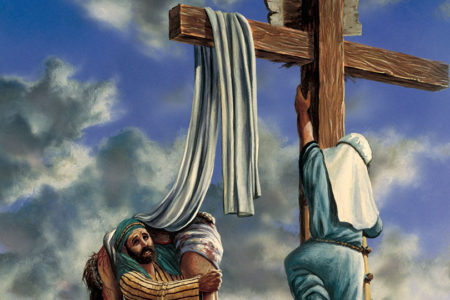
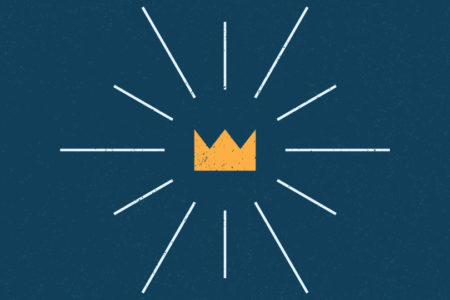



This is wonderful to know thank u very much.And that JESUS was at Jerusalem walking in Solomon’s porch.My daughter-in-law is Jewish perhaps I will take a dreidel and shinney pennies and chocolate coins with me upon our visit up there at Christmas